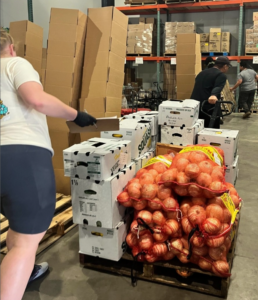Fruitful Collaborations: A Conversation With Molly Sandfoss
go.ncsu.edu/readext?1091639
en Español / em Português
El inglés es el idioma de control de esta página. En la medida en que haya algún conflicto entre la traducción al inglés y la traducción, el inglés prevalece.
Al hacer clic en el enlace de traducción se activa un servicio de traducción gratuito para convertir la página al español. Al igual que con cualquier traducción por Internet, la conversión no es sensible al contexto y puede que no traduzca el texto en su significado original. NC State Extension no garantiza la exactitud del texto traducido. Por favor, tenga en cuenta que algunas aplicaciones y/o servicios pueden no funcionar como se espera cuando se traducen.
Português
Inglês é o idioma de controle desta página. Na medida que haja algum conflito entre o texto original em Inglês e a tradução, o Inglês prevalece.
Ao clicar no link de tradução, um serviço gratuito de tradução será ativado para converter a página para o Português. Como em qualquer tradução pela internet, a conversão não é sensivel ao contexto e pode não ocorrer a tradução para o significado orginal. O serviço de Extensão da Carolina do Norte (NC State Extension) não garante a exatidão do texto traduzido. Por favor, observe que algumas funções ou serviços podem não funcionar como esperado após a tradução.
English
English is the controlling language of this page. To the extent there is any conflict between the English text and the translation, English controls.
Clicking on the translation link activates a free translation service to convert the page to Spanish. As with any Internet translation, the conversion is not context-sensitive and may not translate the text to its original meaning. NC State Extension does not guarantee the accuracy of the translated text. Please note that some applications and/or services may not function as expected when translated.
Collapse ▲In the foothills of Western North Carolina the local food landscape is a testament to the power of community and collaboration. For the past several years, the North Carolina Cooperative Extension in McDowell County has been a leader and trusted partner in local food system development, spearheaded by its dedicated County Extension Director Molly Sandfoss. Molly has a wide range of responsibilities spanning across consumer horticulture, digital skills, administrative support for her office, and local food systems. Her work goes beyond administrative duties; she is an educator, a champion, and a catalyst for change. Molly loves learning new skills across program areas that she can share with her community.

Molly Sandfoss, County Director of McDowell County Cooperative Extension
The most rewarding part of her work, Sandfoss explains, is seeing the tangible impact. “Since I have been in this role,” she says, “I have seen changes that have provided a positive impact for our consumers and growers.” A major milestone has been the establishment of the Foothills Food Hub, a physical space that has become an important cornerstone of the county’s food system. This space allows local farmers to aggregate their products that can be sold to address community goals, such as addressing food security, supporting local businesses, and getting local products to more residents. The success is evident in the numbers: since 2022, over $2 million has been spent on purchasing food from farmers to support programs through the McDowell Local Food Advisory Council.

Commercial kitchen space in Foothills Food Hub. Photo from Foothills Food Hub.
The local food landscape in McDowell County is a “tale of two cities,” as Sandfoss puts it. Historically, the county’s economy was dominated by manufacturing, with agriculture taking a backseat. Molly has spent her career working as a network convenor, facilitator, and educator to make the case for local food and agriculture systems as an essential community system and engine for economic development. A challenge she has found is shifting the perception that local food is an unaffordable luxury for a community with limited disposable income. However, the McDowell Local Food Advisory Council has served as a like-minded network in support of this vision. Additionally, McDowell County has lower land prices, which has attracted new and career-changing farmers, along with younger generations interested in farming. This influx is helping to expand the local food supply and create a more vibrant agricultural community.
A project she takes immense pride in is the Foothills Food Hub. As chair of the McDowell Local Food Advisory Council, she has been instrumental in the recent acquisition and renovation of a new space for the Hub. This new facility is a game-changer, equipped with a large drive-in cooler, additional cold storage, office space, and a future teaching/commercial kitchen. This brick-and-mortar hub is not just a building; it’s a symbol of community vision and hard work. Its success, Sandfoss emphasizes, is due to a collaborative effort. “For collaborative work to be successful, you need people that have a stake in the process/program,” she says. The Hub was a community effort, born from the shared vision of producers, pantry leaders, and grassroots organizers who saw a need and came together to make it a reality.

Food at Foothills Food Hub. Photo from Foothills Food Hub Instagram.
For other Local Foods Coordinators across the state, Sandfoss’s advice is simple yet profound: “Get like-minded people involved with your programming.” She acknowledges that collaboration is hard, with its fair share of highs and lows, but it is “well worth it knowing that you are not alone in the process.” She also highlights the support of the NC State Extension Local Foods Program Team, which provides curriculum and resources that can be integrated into local programming.
Looking to the future, Sandfoss sees a mixed but hopeful landscape for local foods in North Carolina. While an influx of new residents with higher disposable incomes presents an opportunity for direct-to-consumer sales, the challenges of an aging farmer population and limited agricultural land remain.
When she’s not shaping the future of her county’s food system, Sandfoss enjoys the simple pleasure of local food herself. As a member of a CSA, she frequents the Historic Marion Tailgate Market to pick up her share. Her favorite way to enjoy the harvest is a Ratatouille recipe, which she loves making with local squash, peppers, eggplant, and tomatoes—a perfect way to savor the fruits of her labor.


